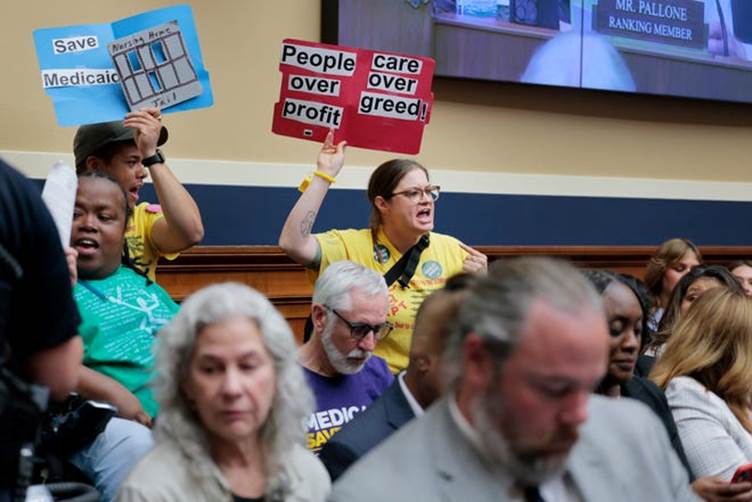WASHINGTON — In a bold move, House Republicans have proposed sweeping changes to the Medicaid program that could strip millions of Americans of their healthcare coverage. Currently, Medicaid serves over 71 million low-income individuals, but this new bill aims to overhaul the system entirely, introducing a range of new rules and eligibility requirements for those seeking coverage.

Families of four earning as little as $35,365 could face new costs for basic doctor visits, and some unemployed individuals may find themselves disqualified from Medicaid. Seniors may also lose access to long-term care services, while states will lose vital federal funding that helps cover people just above the poverty line. Additionally, the bill seeks to bar Medicaid from funding services at clinics, including Planned Parenthood, that offer abortion services.
This proposal is part of a massive policy overhaul designed to fulfill President Donald Trump’s campaign promises, including an extensive set of tax cuts expected to cost the U.S. $4 trillion over the next decade. In a bid to balance this revenue loss, Republican leaders are looking to offset these costs with significant cuts to federal spending, including health insurance programs.
Medicaid, one of the largest categories of federal spending, has been identified as a primary target. President Trump has already made it clear that Medicare is off the table, so Medicaid has become the central focus for potential savings. The program covers approximately 20% of Americans, including around 40% of children.
Although the proposed changes aren’t as severe as some of the initial cuts considered, they remain significant. The nonpartisan Congressional Budget Office (CBO) estimates that the changes would save the federal government at least $625 billion. However, the impact could be even more profound, as the CBO was unable to fully analyze the effects of several provisions in the bill before the estimates were released. The CBO also predicts that around 7.6 million Americans will lose their Medicaid coverage over the next ten years due to these cuts.
One particularly concerning aspect of the proposal is the projected loss of Medicaid coverage for 1.3 million individuals who are currently enrolled in both Medicaid and Medicare, meaning they would lose access to critical benefits such as long-term care, which Medicaid provides but Medicare does not.
Joan Alker, the executive director of the Center for Children and Families at Georgetown University, voiced concerns over the potential consequences. “Medicaid is absolutely critical for children, families, people with disabilities, and seniors,” she said. “There’s so much at stake here.”
The debate surrounding the proposal has been heated. During a tense House committee hearing on May 13, Republicans and Democrats traded accusations, with Republicans claiming the changes were intended to eliminate waste, fraud, and abuse in the system, while Democrats argued that the cuts would drastically reduce access to vital healthcare.
Rep. Brett Guthrie, R-Kentucky, chair of the House Energy and Commerce Committee, emphasized that the bill was meant to streamline Medicaid and eliminate inefficiencies. “Medicaid was created to provide healthcare for Americans who otherwise could not support themselves, but Democrats expanded the program far beyond its original mission,” he said.
On the other hand, Rep. Alexandria Ocasio-Cortez, D-New York, condemned the proposal as a direct attack on low-income families. “We are cutting money and healthcare from people who are suffering to pay for tax cuts for the rich,” she argued.
So, what exactly is in this legislation? Here’s an overview of some of the proposed changes.
Changes to Medicaid Expansion
Medicaid was initially designed to provide health coverage for low-income individuals. The Affordable Care Act (ACA) expanded Medicaid eligibility to cover non-senior low-income adults in every state, with the federal government agreeing to pay for 90% of the cost of this expansion. States were responsible for the remaining 10%. However, the Republican proposal would eliminate the federal financial incentive that helped 41 states, along with Washington, D.C., to adopt the expansion.
Additionally, the bill would allow states to charge fees of up to $35 per service for Medicaid recipients earning between 110% and 138% of the federal poverty level, which ranges from $35,365 to $44,367 annually for a family of four.
Work Requirements
A major provision of the proposed bill is the introduction of strict work requirements for adults enrolled in Medicaid expansion. Robin Rudowitz, vice president of KFF, a nonpartisan health policy organization, highlighted that these provisions are expected to result in substantial coverage loss. “Almost half of the estimated savings come from work requirements,” she said.
Under the new rules, individuals between the ages of 19 and 64 would have to prove they are working, participating in community service, or enrolled in an educational program for at least 80 hours a month. Certain groups, including pregnant women, individuals with disabilities, and caregivers of dependent children, would be exempt from this requirement.
Work requirements have proven controversial. A similar program in Arkansas resulted in 25% of participants losing coverage because they failed to meet reporting requirements or prove their eligibility for exemptions.
Increased Eligibility Checks
The Republican bill proposes increasing the frequency of eligibility checks for Medicaid enrollees from annually to every six months. States would also be required to verify contact information, prevent multiple enrollments in different states, and regularly review the Master Death File to check for deceased individuals. The bill would also limit retroactive Medicaid coverage to just one month before an individual applies, down from the current three months.
Changes to Coverage for Undocumented Children
The bill targets undocumented immigrants by eliminating the requirement for states to provide Medicaid coverage during the 90-day verification period for immigration status. States would still be allowed to provide coverage, but they would not receive federal matching funds during this period. States that use their own funds to cover undocumented children would face a reduced match rate from 90% to 80%.
Planned Parenthood Provisions
The bill also includes provisions aimed at Planned Parenthood. Currently, Medicaid recipients can use federal funds to access services from any qualified provider, including those offering family planning and reproductive health services. However, under the proposed bill, Medicaid would be prohibited from reimbursing clinics that primarily focus on family planning or provide abortions.
These changes would mark a dramatic shift in healthcare policy, impacting millions of Americans, particularly the most vulnerable populations. While the proposal is still in the early stages, it is expected to fuel significant debate in the coming months.



